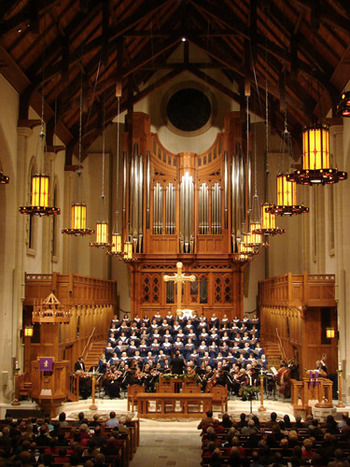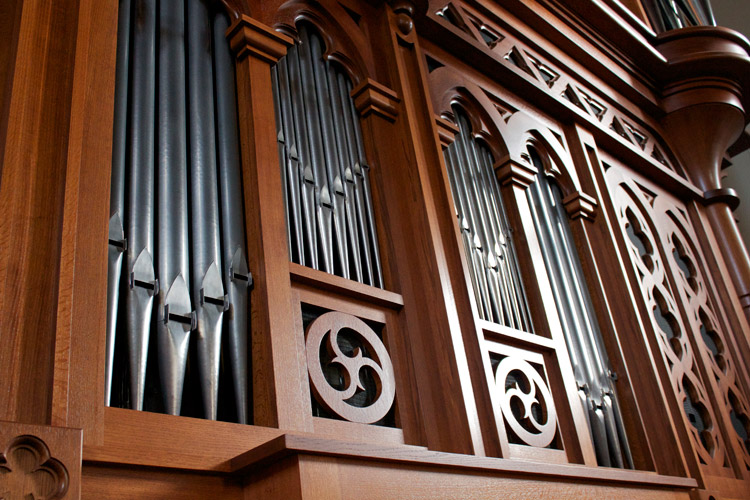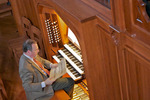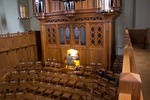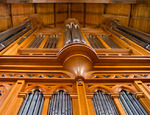Part seven of this series was to have been the end of it. But the story has more to say:
Picture it: May 2012. Music City Mixture is ready for me to peddle at the organists’ convention. Promotional information is prepared. Free copies of my previous recording Live Performances are ordered and on their way to be inserted into convention tote bags. An announcement card for the new recording is printed up with the special convention price, also to be inserted into convention tote bags. And just for good measure, I have had fresh copies of my promotional brochure printed, also to be inserted into convention tote bags. There is a “party” with friends where we stuff promo CDs, announcement cards, and Joby brochures into two thousand little plastic bags. I ship those little guys off to the convention city, where they will be dropped into convention tote bags for all attendees. What a publicity coup! Imagine the mileage we’ll get out of this! Imagine people arriving at the convention, finding those materials in their tote bag, seeking me out, and purchasing a copy of the new CD! And the national “release party” for Music City Mixture is an enormous success! Master of the universe in the house!
Now picture what really happened: When I arrived for the convention, I discovered that all those promotional materials had not been dropped into the tote bags, after all. They were still sitting in the receiving warehouse, where they did not see the light of day again until convention day two.
So now imagine the sudden uselessness of all that publicity. Imagine all the money and time invested. Imagine two thousand giveaway previous CDs sitting forgotten in a warehouse, and one thousand brand new CDs in my car, now with no buyers who know about it.
My first order of business to salvage this was to retrieve all those publicity materials, which I did. After that, I was in no mood to stay and enjoy the convention, and so I took my bitterness elsewhere. I hadn’t intended to tell this tale publicly, but the passage of time has brought to light some lessons learned and new things to try that are worth airing:
1. The two thousand giveaway CDs, Live Performances, intended for convention tote bags, are still available for giveaway. I’ll be hauling them to recital engagements, family reunions, workshops, doctors’ offices, etc., and giving them to any interested people.
2. I am preparing a mass email to all convention attendees, to announce Music City Mixture. (The special convention price no longer applies.)
3. Meanwhile, I have been plunged into uncharted territory, such as questioning for the very first time the usefulness of the national organization to my career, reconsidering my eagerness to accept service opportunities in it, reconsidering my love of conventions over which I was so enthusiastic in the first post of this series, considering attending other organizations’ conventions, and withholding my trust in others for longer initial periods from now on.
4. HOWEVER: This incident put my quota for grudges over the limit! Were I to add this grudge to all my existing ones, I would start to have trouble keeping up and remembering who’s who. And so one day I found a strange calm in letting all those grudges go, in an instant. You know, folks, when all this is over, the cockroaches will be the only ones left, and I can learn to get over a few first-world problems along the way. I have felt better since arriving at that place of peace. I even accepted a Facebook friend request that I had left untouched for months, from someone who treated me most unprofessionally and uncharitably several years ago. Although I will not mistake a grudge for unfinished business, and although I will always be astounded by how easily Music City Mixture’s initial publicity was derailed, I can let go of the little stuff better. My doctor should be pleased with my blood pressure numbers from now on.
And NOW this series really is ended. Many millions of thanks to Bradley Gawthrop for slapping the software around to accommodate all these photos and sound files. Splendid work.
 Monday, November 5, 2012 at 7:18AM
Monday, November 5, 2012 at 7:18AM 


